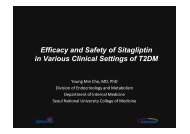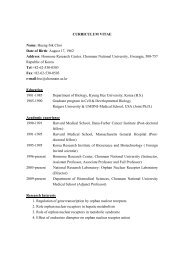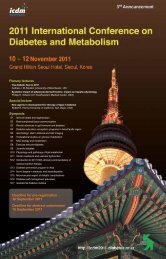Scientific program - 2012 International Conference on Diabetes and ...
Scientific program - 2012 International Conference on Diabetes and ...
Scientific program - 2012 International Conference on Diabetes and ...
You also want an ePaper? Increase the reach of your titles
YUMPU automatically turns print PDFs into web optimized ePapers that Google loves.
<str<strong>on</strong>g>Scientific</str<strong>on</strong>g> <str<strong>on</strong>g>program</str<strong>on</strong>g>Thursday 8 Nov. 14:00~16:00 / C<strong>on</strong>venti<strong>on</strong> Hall B, 4FProfessi<strong>on</strong>al secti<strong>on</strong> interest group 3New strategy for beta-cell replacement therapyChair : Kwang W<strong>on</strong> Kim<str<strong>on</strong>g>Scientific</str<strong>on</strong>g> <str<strong>on</strong>g>program</str<strong>on</strong>g>1. Molecular shielding of pancreatic islets for xenotransplantati<strong>on</strong> Young Ro Byun (Seoul Nati<strong>on</strong>al University, Korea)2. Islet cytoprotecti<strong>on</strong> for islet transplantati<strong>on</strong>Sung Hee Ihm (Hallym University, Korea)3. Cell therapeutics for the insulin-dependent diabetes mellitus Hae Kw<strong>on</strong> Kim (Seoul Women’s University, Korea)4. Differentiati<strong>on</strong> <strong>and</strong> transplantati<strong>on</strong> of functi<strong>on</strong>al pancreatic beta cells generated from induced pluripotentstem cells derived from a type 1 diabetes mouse modelSsang Goo Cho (K<strong>on</strong>kuk University, Korea)Organizer: 베타세포 연구회췌도 이식은 당뇨병의 완치 수단으로서 임상 적용이 활발히 시도되고 있으나, 췌도의 공여자가 제한적이고 면역 억제제를 사용해야하는 부담이 있어 제한된 환자에게만 시행되어 왔다. 본 심포지엄에서는 ‘New strategy for beta-cell replacement therapy’를 주제로 췌도 이식 및 줄기세포로부터의 베타세포 분화 연구의 영역에서 그 동안의 한계를 극복하고자 하는 새로운 시도들을 소개하고자 한다. 서울약대 변영로 교수는 single cell level의 gene therapy 및 PEG를 이용한 microencapsulati<strong>on</strong>을 통한 새로운 췌도 이식 방법을 소개할 것이며, 한림의대 임성희 교수는 GLP-1 gene expressi<strong>on</strong>이 췌도 이식에서 이식편의 기능에 미치는 영향을 발표할 것이다. 서울여대 김해권 교수는 amniotic mesenchymal stem cell로부터 분화된 인슐린 분비 세포를 통해 면역 억제 없이 설치류 제1형 당뇨병 모델에서 정상 혈당을 얻은 결과를 발표할 예정이다. 건국대 조쌍구 교수는 induced pleuripotent stem cell에서분화를 유도한 베타세포를 설치류 제1형 당뇨병 모델에 이식한 결과를 발표할 예정이다.Thursday 8 Nov. 14:00~16:00 / C<strong>on</strong>venti<strong>on</strong> Hall C, 4FProfessi<strong>on</strong>al secti<strong>on</strong> interest group 4Korean <strong>Diabetes</strong> Associati<strong>on</strong> interest group <strong>on</strong> geneticsChair : Sung Ho<strong>on</strong> Kim1. Genome analysis using NGS (next generati<strong>on</strong> sequencers) J<strong>on</strong>g Hwa Bhak (Genome Research Foundati<strong>on</strong>, Korea)2. East Asian GWA meta analysis for metabolic traits Min Jin Go (Korean Nati<strong>on</strong>al Institute of Health, KCDC, Korea)3. Master AMT database approach for label-free quantitati<strong>on</strong> (MAD4QUAN): applicati<strong>on</strong> to uncover biomarkersfor T2DMSang W<strong>on</strong> Lee (Korea University, Korea)4. Intermediate trait loci that predict the risk of type 2 diabetesJi Wan Park (Hallym University, Korea)Organizer: 당뇨병 유전학 연구회최근 5-6년간 유전체 분석 기법이 눈부신 속도로 발전함에 따라 당뇨병의 유전적 소인에 대한 많은 연구가 이루어졌다. 전장 유전체 연관성 분석(GWAS)을 통해 50여개 이상의 당뇨병 관련 유전자 변이가 규명되었으며 혈중 포도당 농도, 인슐린 농도와 관련된유전자 변이도 다수 발견되었다. 이러한 발전은 당뇨병의 병인을 더욱 잘 이해하여 새로운 치료의 타깃을 규명하고 보다 개별화된맞춤형 치료의 근간을 제공해 줄 것으로 기대된다. 당뇨병 유전학 연구회에서는 이러한 발전의 선두에 있는 연구자들의 최근 연구결과와 경험을 나눌 수 있는 자리를 마련하였다. 박종화 게놈연구소 소장은 차세대 염기서열분석(Next Generati<strong>on</strong> Sequencers)을활용한 유전체 연구의 현재와 미래에 대하여 강연할 것이다. 국립보건원 고민진 박사는 아시아인에서 당뇨병과 관련된 대사 형질의GWAS 메타 분석 결과를 발표할 것이다. 고려대학교 화학과 이상원 교수는 최신 프로테옴 분석 기법을 이용하여 당뇨병환자의 내장 지방 단백체 분석을 수행한 결과를 발표할 것이다. 마지막으로 한림대학교 의학유전학교실 박지완 교수는 대사형질과 관련된 유전자 변이를 이용한 당뇨병 예측에 대하여 강연할 것이다.8<str<strong>on</strong>g>2012</str<strong>on</strong>g> <str<strong>on</strong>g>Internati<strong>on</strong>al</str<strong>on</strong>g> <str<strong>on</strong>g>C<strong>on</strong>ference</str<strong>on</strong>g> <strong>on</strong> <strong>Diabetes</strong> <strong>and</strong> Metabolism


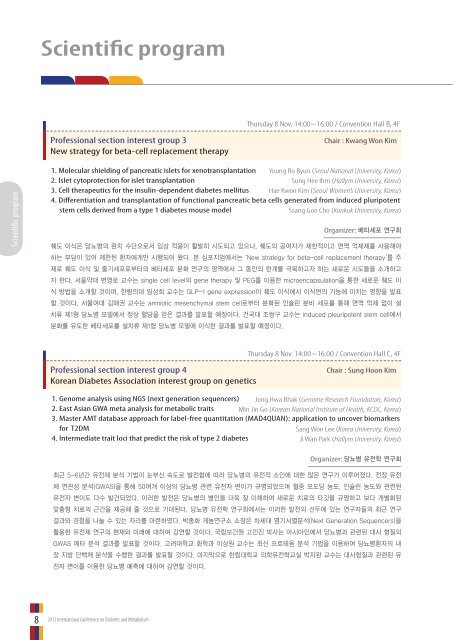
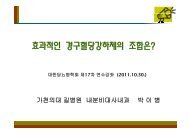
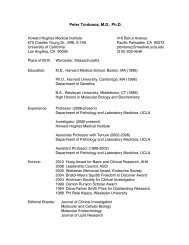

![Microsoft PowerPoint - src.ppt [\310\243\310\257 \270\360\265\345]](https://img.yumpu.com/47977670/1/190x134/microsoft-powerpoint-srcppt-310243310257-270360265345.jpg?quality=85)

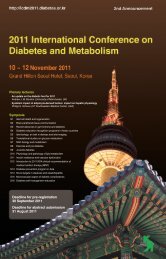

![Microsoft PowerPoint - src.ppt [\310\243\310\257 \270\360\265\345]](https://img.yumpu.com/44373305/1/190x134/microsoft-powerpoint-srcppt-310243310257-270360265345.jpg?quality=85)


